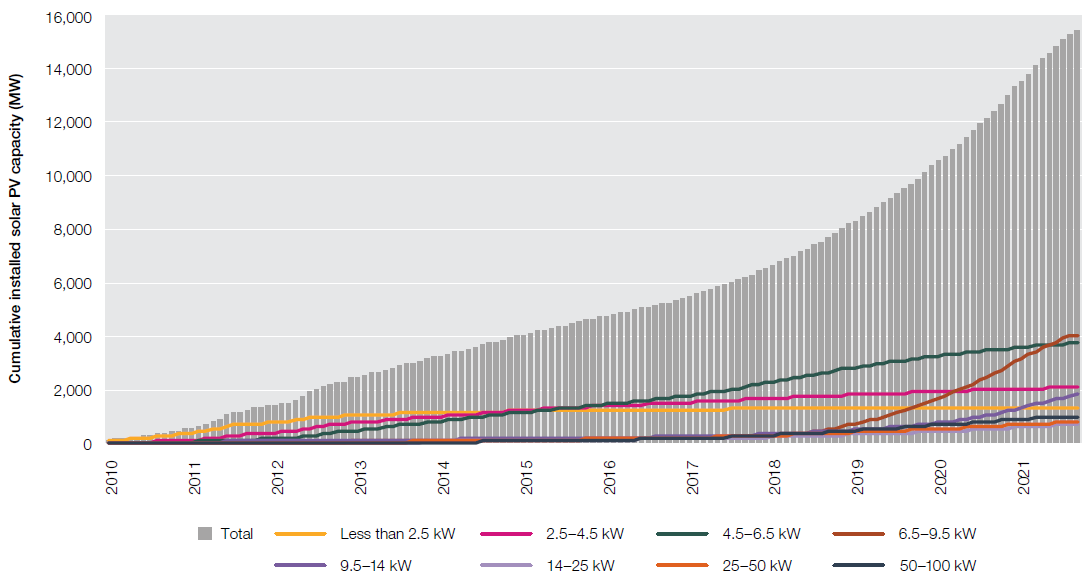Energy policy is one of the great dilemmas facing Australian politics, and the cold war between renewables and voters is escalating rapidly. Of the challenges facing renewables deployment in Australia, facts and logic are existential threats that must be obliterated, else the age of renewables will be relegated to a footnote in history. Surprisingly the CSIRO’s GenCost recently received reasoned criticism on its sunk cost assumptions, a victory for rationality.
The information war being waged by the renewables lobby is designed to damage the economics and social licence of our baseload generators, a technology that needs to run flat out 24/7 to earn its keep. As more intermittent generators connect to the grid, the utilisation rate of all baseload generators reduces, a slow-acting MOAB dropped on our baseload-dominant grid. In addition, heavily subsidised rooftop solar is fast approaching the 16,000 MW mark, shrinking the market share available to baseload generators.

Source: AER State of the Energy Market Report, 2022
As with many things that seem too good to be true, and despite much of the media championing the renewables cause, a peek under the glossy cover reveals a generic and boring product. Unlike renewables, baseload generators like coal and nuclear have physics on their side. Further, nuclear wins The Science on metrics such as emissions (not just CO2), land use, and lifespan. According to recent polls, nuclear also has social license, and with a little work its economic benefits can be proven too.
Ask about public renewables supporters and you will find a hefty range of political activists, mining giants, and political leaders, past and present, that generate a rockstar-like ambience. These characters put renewables in, but not under, the spotlight. You would be correct if you extended the pro-renewables mantle to the organisations embedded in our energy sector – AEMO, AEMC, AER, and the CSIRO.
Now, try to name a well-known nuclear power advocate in Australia. If you came up with Adi Paterson, former head of ANSTO, you are doing well. In fact, Adi is but one of a group of relatively anonymous engineers, economists, and industry veterans spanning several countries who are all working to see nuclear power succeed in Australia.
These advocates are savvy, knowledgeable, and well-connected. They know their stuff and are trying hard to be the adults in the room, making sensible arguments in the belief their work will eventually result in a nuclear power industry in Australia. They see this as essential for the good of the country. I’m not far behind, with the caveats that coal is cheaper, and legal for the time being.
However, many believe that a shared passion for reducing CO2 emissions makes nuclear and renewables teammates, blissfully joining forces to save the world. This is a dangerous misconception. These technologies are not compatible – technically, economically, ideologically – and the renewables lobby cannot afford to let nuclear get a foot in the door. Failing to challenge renewables head-on will not just delay the sensible adoption of nuclear power in Australia but will relegate it to wishful thinking for generations.
Propaganda is the use of misleading information to promote a political cause, and the propaganda machine in this war on baseload is slick and well-established. Government agencies are not immune. The public’s trust in institutions should be decimated following a series of public misinformation travesties piling up in the last few years. Covid, Russia-gate, and the Twitter Files (detailing government involvement in social media censorship) are just the tip of the iceberg.
Consider the startling admission by CSIRO’s chief energy economist. Responding to Claire Lehmann’s article criticising GenCost – the report that has shaped our electricity policy since its inception in 2018 – the CSIRO was forced to acknowledge that the criticism was correct. Namely, GenCost ignores a host of massive investment costs up to 2030 necessary to integrate more renewables.
In the CSIRO’s words: ‘All existing generation, storage, and transmission capacity up to 2030 is treated as sunk costs since they are not relevant to new-build costs in that year.’ Source: Paul Graham, the Australian August 2, 2023.
Stephen Wilson points out that while sunk costs are defined as costs never to be recovered, the cost of transmission lines and generators is recovered through our electricity bills. Accordingly, GenCost’s argument is wrong, and the list of projects the CSIRO glibly downgrades as sunk costs runs to tens of billions of dollars – all recoverable from consumers. It must be repeated that these projects are only necessary to ensure our electricity sector can be dominated by renewables long into the future.

Source: GenCost, 2022
The GenCost report states, ‘The analysis confirms that when integration costs are included variable renewables remain the lowest cost new-build technology.’
Is this information accurate, misleading, perhaps even political? You be the judge. Aidan Morrison, a data scientist rapidly earning well-deserved infamy for bringing the CSIRO’s sunk cost baseline to the public’s attention via Twitter, likens the report’s findings of cheap renewables to being cheap getting to the moon when you are already halfway there.
My take is that the CSIRO’s strategy on costing renewables is equivalent to buying a new couch without first buying the house to put it in. In that light, GenCost is a perfect vehicle for those willing to use misleading information to promote a political cause.
Ben Beattie is an electrical engineer in the power and gas sector.











